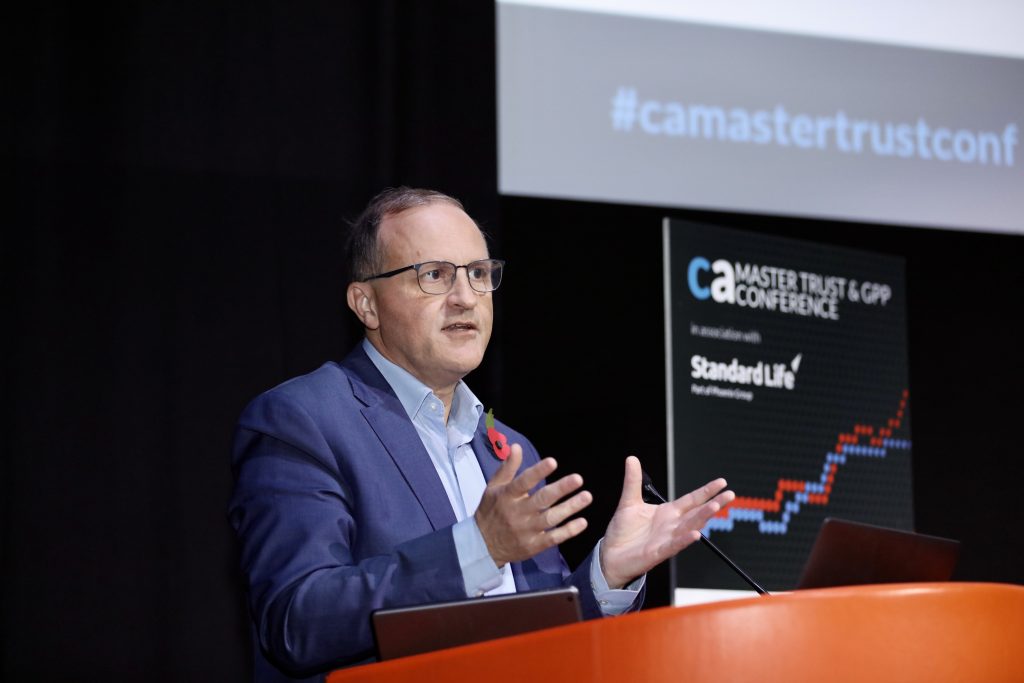The new pension minister Laura Trott needs to prioritise retirement adequacy, and legislate for future AE contributions, according to LCP partner and former pensions minister Steve Webb.
Speaking at Corporate Adviser’s Master Trust and GPP Conference he said he would favour the PLSA proposals of 5 per cent contributions from both employer and employee.
Webb said he appreciated that increasing payments for either was problematic currently, given the pressure of rising costs on both individuals and businesses. “But legislation should be timetabled now that would put in place increases a few years down the line.”
Webb said there was an urgent need for higher contribution levels into AE pensions pensions, but there was a danger that this change could be “years down the track” if government waited before they start trying to increase minimum contribution levels.
Webb said lessons could be learned from the past, where there was relatively little opposition to increases to the state pension age as these were scheduled at least 10 years in the future. He said the then chancellor George Osborne described the money saved by this measure as “the easiest billions he ever raised”.
He added that requiring both employers and employees to contribute 5 per cent would result in more money going into these savings pots, and potentially fewer opt outs, as employees would be missing out on substantial payments by taking this course of action.
Webb said that other recommendations made in the 2017 review into AE pensions should also come into force, such as basing contribution levels from the first £1 of earnings.
Webb reflected on his own time as pension minister overseeing the start of AE, saying that there were lessons to be learned for its future evolution.
He added that government ministers and the civil service did not always “get markets” and had been slow, for example, to anticipate the proliferation of master trusts, many of which, he said “should have been killed at birth”. However he pointed out that the TPR authorisation had since made dramatic improvements to this sector.
The government also needs to ensure that there is consistent messaging around auto-enrolment, he said, and criticised a number of the publicity campaigns that have appeared in recent years, particularly the ‘Workie’ advertisement which he said projected a “confused message” for SME employers.
One important lesson learned he said was the importance of not taking at face value consumer surveys which purport to show what people will do when it comes to pension saving. He pointed out that initially there were predictions that a third of people would opt out of AE, when the actual numbers were less than 10 per cent.
“The whole system is based on behavioural biases and people do not reliably predict their actions as they are unaware of how these biases affect them,” he said.
With this in mind he warned the audience to be sceptical of current surveys predicting a significant number of people dropping out of AE in the wake of the cost of living crisis. While affordability remains an issue to be mindful of, Webb said to date the actual data shows “when it comes to cessation of savings the number stopping AE contributions is tiny”. Those working across the industry need to look at data as to what consumers do, rather than simply predictive surveys he said.
Looking ahead he says that well as addressing adequacy, there were a number of key AE challenges for the decade ahead. This includes measure to address the proliferation of small pots, challenges around retirement options for savers – particularly given pension freedoms, and whether there should be more done to encourage employers to switch to better pension arrangements where necessary.
Webb said: “Once an employer has chosen a provider there does not seem to be much switching. There is too much inertia in this market and perhaps this is an area that we could look to poke with a stick.”
He adds that the issue of including the self-employed within AE is important but did not see this as a priority for the current government or even a Labour government, particularly as it was likely to be cost additional tax relief.
Given the current financial constraints on the government he predicted that lifetime allowances and annual allowances would continue to be frozen beyond the current five year limit, and there may also be reductions to the LA, with a possible carve out for doctors.
He said the Treasury could be more creative when it came to tax relief but did not foresee any imminent change. “It is a question [when it comes to tax savings] of where to pluck the goose with the minimum hissing,” he said, with the inference that losing higher rate tax relief may produce some loud honks from those who would be adversely affected.
